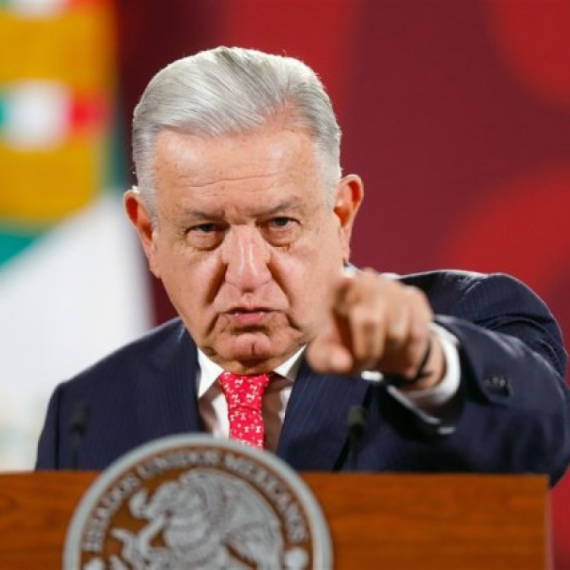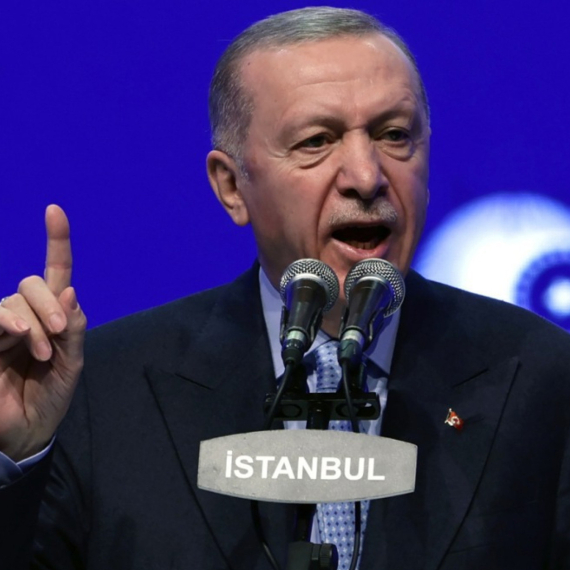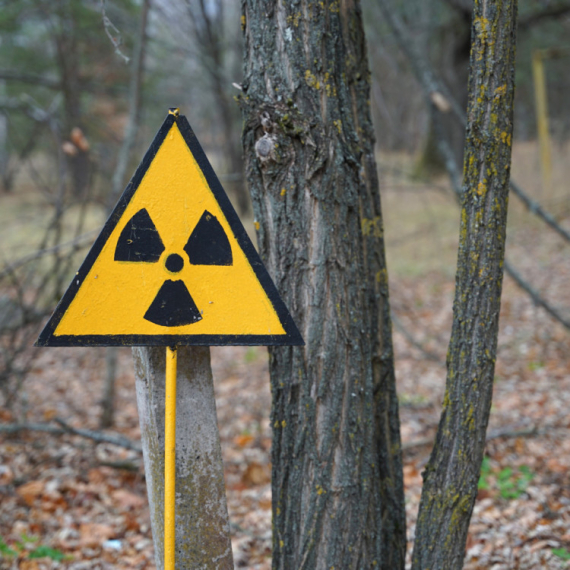U.S. terror report mentions witness intimidation in Kosovo
Serbia cooperated with the U.S. on a wide range of terrorism issues, a report says.
Thursday, 01.05.2008.
10:58

Serbia cooperated with the U.S. on a wide range of terrorism issues, a report says. The United States State Department Country Reports on Terrorism released yesterday, also says that although Serbia joined the Global Initiative to Combat Nuclear Terrorism, the bilateral Weapons of Mass Destruction Agreement, signed in 2006, has not yet been ratified. U.S. terror report mentions witness intimidation in Kosovo "Failure of the Serbian Parliament to ratify the agreement prohibited the duty free import and donation of equipment that could be used to counter terrorism," the document says. According to the report, the cooperation between Serbia and the U.S. included border security, information sharing, terrorist financing, and export controls. It mentions the March 2007 raid Novi Pazar when "large quantities of plastic explosives, ammunition, face masks, military uniforms, bombs, and other supplies were found at the site, which authorities believed was a training camp for Muslim fighters". Kosovo, which the State Department treats as a separate country, meanwhile suffered having "small police units lacking resources" dealing with the threat of terrorism. "Porous boundary lines that were easily crossed by individuals trafficking in people, weapons, and narcotics hampered Kosovo’s counterterrorism efforts. The Kosovo border police service lacked basic equipment, and only had a mandate to patrol the green border (areas that lack official, manned border, or administrative boundary line gates) from two to three kilometers beyond the actual border and boundary lines," the report says. "NATO-KFOR roving teams patrolled the green border right up to the actual border and administrative boundary lines, but numerous passable roads and trails that lead to Kosovo lack border or boundary gates. Moreover, poorly paid border and customs officials were susceptible to corruption," it continued. "Witness intimidation was also an obstacle to combating terrorism in Kosovo. UNMIK’s Department of Justice reported that it created a Witness Protection Task Force to address this issue. The Task Force reportedly worked on constructing a new safe house in Kosovo, encouraged the use of video conferencing equipment now in place in Kosovo’s district courts, and increased efforts to secure relocation agreements with other jurisdictions," the U.S. terrorism report reads. UNMIK's Department of Justice is quoted as source of information that there were three terrorism-related convictions in Kosovo last year, and seven terrorism cases underway with local judges and prosecutors. International prosecutors and the Kosovo Special Prosecutor’s Office (KSPO) also initiated four terrorism-related investigations and filed two indictments, which were pending confirmation at year’s end. One of the indictments was related to Albanian National Army (ANA) activity, the report says, and one of the investigations involved the Front for Albanian National Unification the ANA's "political wing". The ANA, "which UNMIK designated as a terrorist organization in 2003, continued to intimidate Kosovo citizens", the report, which refers to the terror group by its Albanian acronym AKSH, said. In June, its Tirana-based spokesman, Gafurr Adili, told Kosovo media that AKSH members in several Kosovo towns had distributed leaflets threatening violence if the Serbian paramilitary group Tsar Lazar Guard ventured into Kosovo for the annual June 28 commemoration of the 1389 Battle of Kosovo." "Kosovo Liberation Army (KLA) war veteran leader Abdyl Mushkolaj also made similar threats, adding to concerns over the commemoration. In an October interview on Radio Television Kosovo (RTK), heavily armed, masked individuals in black uniforms bearing the AKSH insignia appeared from an undisclosed location described as an AKSH training facility near the administrative boundary line with Serbia," the report reminded. It adds that Adili later claimed that the people RTK featured were ANA and that they were “filling a void” created by KFOR’s alleged abandonment of several villages near Serbia proper in the municipalities of Podujevo and Kamenica. "AKSH had long claimed to operate only in areas outside of KFOR or Kosovo Protection Corps control, and was reportedly also active in southern Serbia and western Macedonia," the State Department concluded.
U.S. terror report mentions witness intimidation in Kosovo
"Failure of the Serbian Parliament to ratify the agreement prohibited the duty free import and donation of equipment that could be used to counter terrorism," the document says.According to the report, the cooperation between Serbia and the U.S. included border security, information sharing, terrorist financing, and export controls.
It mentions the March 2007 raid Novi Pazar when "large quantities of plastic explosives, ammunition, face masks, military uniforms, bombs, and other supplies were found at the site, which authorities believed was a training camp for Muslim fighters".
Kosovo, which the State Department treats as a separate country, meanwhile suffered having "small police units lacking resources" dealing with the threat of terrorism.
"Porous boundary lines that were easily crossed by individuals trafficking in people, weapons, and narcotics hampered Kosovo’s counterterrorism efforts. The Kosovo border police service lacked basic equipment, and only had a mandate to patrol the green border (areas that lack official, manned border, or administrative boundary line gates) from two to three kilometers beyond the actual border and boundary lines," the report says.
"NATO-KFOR roving teams patrolled the green border right up to the actual border and administrative boundary lines, but numerous passable roads and trails that lead to Kosovo lack border or boundary gates. Moreover, poorly paid border and customs officials were susceptible to corruption," it continued.
"Witness intimidation was also an obstacle to combating terrorism in Kosovo. UNMIK’s Department of Justice reported that it created a Witness Protection Task Force to address this issue. The Task Force reportedly worked on constructing a new safe house in Kosovo, encouraged the use of video conferencing equipment now in place in Kosovo’s district courts, and increased efforts to secure relocation agreements with other jurisdictions," the U.S. terrorism report reads.
UNMIK's Department of Justice is quoted as source of information that there were three terrorism-related convictions in Kosovo last year, and seven terrorism cases underway with local judges and prosecutors.
International prosecutors and the Kosovo Special Prosecutor’s Office (KSPO) also initiated four terrorism-related investigations and filed two indictments, which were pending confirmation at year’s end.
One of the indictments was related to Albanian National Army (ANA) activity, the report says, and one of the investigations involved the Front for Albanian National Unification the ANA's "political wing".
The ANA, "which UNMIK designated as a terrorist organization in 2003, continued to intimidate Kosovo citizens", the report, which refers to the terror group by its Albanian acronym AKSH, said.
In June, its Tirana-based spokesman, Gafurr Adili, told Kosovo media that AKSH members in several Kosovo towns had distributed leaflets threatening violence if the Serbian paramilitary group Tsar Lazar Guard ventured into Kosovo for the annual June 28 commemoration of the 1389 Battle of Kosovo."
"Kosovo Liberation Army (KLA) war veteran leader Abdyl Mushkolaj also made similar threats, adding to concerns over the commemoration. In an October interview on Radio Television Kosovo (RTK), heavily armed, masked individuals in black uniforms bearing the AKSH insignia appeared from an undisclosed location described as an AKSH training facility near the administrative boundary line with Serbia," the report reminded.
It adds that Adili later claimed that the people RTK featured were ANA and that they were “filling a void” created by KFOR’s alleged abandonment of several villages near Serbia proper in the municipalities of Podujevo and Kamenica.
"AKSH had long claimed to operate only in areas outside of KFOR or Kosovo Protection Corps control, and was reportedly also active in southern Serbia and western Macedonia," the State Department concluded.


























































Komentari 3
Pogledaj komentare